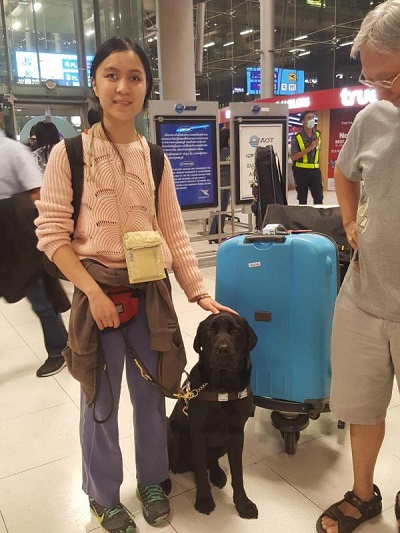A good job for dogs
published : 26 Jan 2019 at 00:20
writer: Gary Boyle
ORIGINAL SOURCE/WRITER: Suwitcha Chaiyong

Guide dogs have a tough job in Thailand
Test Yourself is where you can improve your reading skills. Whether it’s for tests like University Entrance Exams or IELTS and TOEFL, or even just for fun, these pages help you to read, understand and improve your English.
NEW: you can now download a PDF of this story to be used in class or at home. Click the link below.
Read the following story by Suwitcha Chaiyong from the Bangkok Post. Then, answer the questions that follow.
Visually impaired Kirin Techawongtham has travelled independently these past years with her white cane as her only companion. But while studying in the United States, the 22-year-old decided to apply for a guide dog — a black Labrador named Luther.
WARM WELCOME
In Conway, Arkansas, where Kirin is studying, she took Luther everywhere, with the guide dog always welcomed. But things turned completely different when Kirin returned to her hometown of Bangkok during a school break. Here Luther wasn’t welcomed at all.
“In the States, you can take a guide dog everywhere, even in hotels,” said Kirin. “But here [in Thailand], we have to make a call in advance before going somewhere. Some places were OK with us. But some said a guide dog wasn’t allowed there. It’s very frustrating.”
The Ministry of Social Development and Human Security reported last year that Thailand’s disabled population has grown recently by about 100,000-130,000. In total, there were 1.9 million people with disabilities in Thailand in 2018, of which nearly 200,000, or about 10%, are visually impaired.
For the blind, guide dogs are essential, as they are trained to lead the visually impaired around obstacles. In Thailand, guide dogs are extremely rare. Peerapong Jarusarn, secretary at the Thailand Association of the Blind (TAB), said that because most have never seen them, Thais can’t differentiate between guide dogs and pet dogs. And it is one of the major reasons Luther wasn’t allowed in some places — people thought he was just a pet.
DON’T BE SCARED
Though Peerapong doesn’t have a guide dog, he said they are not widely accepted because most Thais do not understand what they are. But the reality is that Thai law actually supports these dogs, according to the Empowerment of Persons with Disabilities Act (2007), which indicates that the disabled have the right to bring guide animals or any equipment for their own benefit.
Other obstacles facing Kirin as she takes Luther around are that some Thais are scared of dogs while others try to draw attention from the animals. This, according to her, is solid proof that Thais still fall short in their knowledge of guide dogs.
“When we are in public, people are wary and ask if he is fierce or bites because in Thailand, we aren’t required to train our dogs. They don’t know that guide dogs are well-trained and disciplined. He wasn’t allowed in some places because people worried that Luther would cause harm or damage things,” Kirin said.
“Some people like to get Luther’s attention by making noises. Some try to pet him. When he is wearing his harness, he is working. We aren’t supposed to interact with him. He needs to be focused. Some Americans don’t know about this either, but at least they asked me first if they can touch him, but Thais don’t.”
One of the reasons guide dogs still aren’t available in Thailand is that getting one requires quite a budget — from dog training to canine care. However, in the US, there are non-profit organisations that provide full services for the blind. In the case of Kirin, she got Luther through the NGO Guiding Eyes for the Blind. Aside from giving her the dog, the organisation supported her for equipment such as leashes and harnesses. And to keep the Labrador healthy, there is a yearly medical fund for him.
A BETTER FUTURE?
In Thailand, this kind of full service may not happen easily. But there will possibly be opportunities for the visually impaired to have guide dogs in the future. In September 2017, the social-development ministry signed a memorandum of understanding (MOU) with the Royal Thai Army, a private-sector organisation, and the TAB to provide guide dogs for the blind. The agreement aims to enhance the disabled’s quality of life and careers.
With the MOU in place, the future remains to be seen when it comes to guide dogs for the visually impaired.
Section 1
Read through the story and answer the following questions.
1. In which state is Kirin studying? …………….
2. Where was Kirin born? …………….
3. What does Peerapong do? …………….
4. Peerapong has a guide dog. True or false? …………….
5. Where did Kirin get Luther from? ………….....
6. How many disabled people were there in Thailand in 2018?
a. 100,000-130,000. b. 1.9 million. c. Nearly 200,000.
7. When should you not interact with a guide dog?
a. When it’s wearing a harness. b. When it’s working. c. Both a and b are correct.
8. Does the MOU mean that the situation will improve for guide dogs?
a. Yes. b. No. c. Maybe.
Section 2
Underline one grammatically incorrect word in each of the following sentences. Then, write down the grammatically correct word in the space given.
9. Facilities to aid people with disabilities in Thailand is a huge public issue. ……………
10. Elevators at some BTS stations have proven to be not very convenience for those in wheelchairs. ……………
11. People who work in public places should be educate to know what guide dogs are. ……………
12. Some hotel staff showing signs saying dogs were not allowed. ……………
13. They finally acceptable the dogs at the hotel. ……………
Section 3
Read the following passage. Then, fill in the blanks with the correct words from the choices given.
“According to the MOU, we ….14…. to do three things. First, a school will be ….15…. for training guide dogs. Next, we have to amend other laws in support ..16.. this agreement. For example, the ….17…. Land Traffic Act doesn’t allow guide dogs on public transportation,” Peerapong said. “People who work in public places such as malls and schools should also be ….18…. to know what guide dogs are. If they don’t want to ….19…. guide dogs inside, they must provide special spaces for guide dogs.”
14. a. have b. must c. could
15. a. made b. established c. open
16. a. with b. to c. of
17. a. now b. current c. currently
18. a. learned b. learn c. educated
19. a. allow b. permission c. permit
Section 4
Find a word used in the story that matches the following definitions.
20. Given permission to let something happen or be done.
21. Causing you to feel annoyed because you cannot do what you want.
22. Not done, seen or happening very often.
23. A helpful and useful effect that something has.
24. The money that is available to a person and a plan of how it will be spent over a period of time.

Answers:
1. Arkansas. 2. Bangkok. 3. Secretary at TAB. 4. False. 5. An NGO. 6. b. 7. c. 8. c.
9. is; are 10. convenience; convenient 11. educate; educated 12. showing; showed 13. acceptable; accepted
14. a. 15. b. 16. c. 17. b. 18. c. 19. a.
20. allowed. 21. frustrating. 22. rare. 23. benefit. 24. budget.
SCORE
21-24: Excellent! 17-20: Good. 13-16: Fair. 12 or fewer: You'll do better next time!
Learn from listening
Vocabulary
- guide dog (n): a dog trained to lead a blind person -
- visually impaired (adj): with a decreased ability to see -
- Keywords
- hellip
- guide dogs
- guide dog

